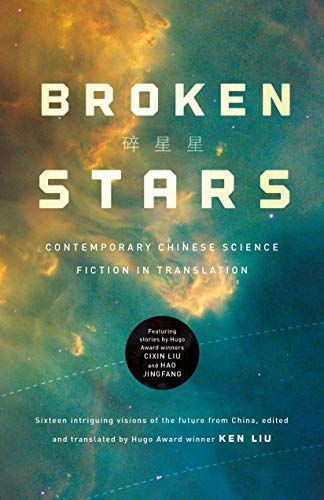
Broken Stars Contemporary Chinese Science Fiction in Translation
Broken Stars, edited by multi award-winning writer Ken Liu--translator of the bestselling and Hugo Award-winning novel The Three Body Problem by acclaimed Chinese author Cixin Liu-- is his second thought-provoking anthology of Chinese short speculative fiction. Following Invisible Planets, Liu has now assembled the most comprehensive collection yet available in the English language, sure to thrill and gratify readers developing a taste and excitement for Chinese SF. Some of the included authors are already familiar to readers in the West (Liu Cixin and Hao Jingfang, both Hugo winners); some are publishing in English for the first time. Because of the growing interest in newer SFF from China, virtually every story here was first published in Chinese in the 2010s. The stories span the range from short-shorts to novellas, and evoke every hue on the emotional spectrum. Besides stories firmly entrenched in subgenres familiar to Western SFF readers such as hard SF, cyberpunk, science fantasy, and space opera, the anthology also includes stories that showcase deeper ties to Chinese culture: alternate Chinese history, chuanyue time travel, satire with historical and contemporary allusions that are likely unknown to the average Western reader. While the anthology makes no claim or attempt to be "representative" or “comprehensive," it demonstrates the vibrancy and diversity of science fiction being written in China at this moment. In addition, three essays at the end of the book explore the history of Chinese science fiction publishing, the state of contemporary Chinese fandom, and how the growing interest in science fiction in China has impacted writers who had long labored in obscurity. Stories include: “Goodnight, Melancholy” by Xia Jia “The Snow of Jinyang” by Zhang Ran “Broken Stars” by Tang Fei “Submarines” by Han Song “Salinger and the Koreans” by Han Song “Under a Dangling Sky” by Cheng Jingbo “What Has Passed Shall in Kinder Light Appear” by Baoshu “The New Year Train” by Hao Jingfang “The Robot Who Liked to Tell Tall Tales” by Fei Dao “Moonlight” by Liu Cixin “The Restaurant at the End of the Universe: Laba Porridge" by Anna Wu “The First Emperor’s Games” by Ma Boyong “Reflection” by Gu Shi “The Brain Box” by Regina Kanyu Wang “Coming of the Light” by Chen Qiufan “A History of Future Illnesses” by Chen Qiufan Essays: “A Brief Introduction to Chinese Science Fiction and Fandom,” by Regina Kanyu Wang, “A New Continent for China Scholars: Chinese Science Fiction Studies” by Mingwei Song “Science Fiction: Embarrassing No More” by Fei Dao For more Chinese SF in translation, check out Invisible Planets.
Reviews
The Hissing Saint@thehissingsaint
jam 🍯@daymarkist
Sahi K@sahibooknerd
Emily@emilywright
Blayke @blayke
lala@polijus
Kelsey Lynn@abibliophagist
Jennifer@vivaldi
Marcel@marcel
Jackie Luo@jackie